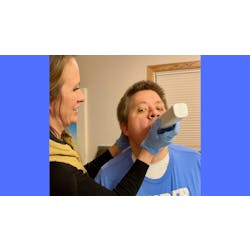Even if it's just a dream, write down something extraordinary that can happen to you
By Susan Clark, RDH, OMMost of us have days when we drag ourselves out of bed, put a plastic smile on, and head off to work, where we are overworked, underappreciated, and taken for granted. Does it seem like the dozen balls you juggle fall to the ground and you want to give up? Is it difficult to muster the energy to care because your problems seem insurmountable and everything looks bleak? If each day begins like this, you may be experiencing burnout.
Burnout is a state of emotional, mental, and physical exhaustion caused by excessive and prolonged stress.1 It may occur when your sense of control is undermined or limited, and you do not feel you have a voice in what's going on around you. Are your core values and those of the dental practice disconnected? Have you received a raise recently, or do you feel undercompensated for all the tasks required of you?
As your stress continues and the practice of doing hygiene becomes more repetitive and routine, you lose interest or motivation for the reasons you wanted to be a dental hygienist in the first place. Burnout reduces your productivity and saps your energy, leaving you feeling increasingly helpless, hopeless, cynical, and resentful.2 You have no desire to consider changes that may spark new thoughts and ideas and give you that burst of energy required to keep up your stamina.
Due to its very high stress and high risk, dentistry is considered to have one of the highest burnout rates of all professions. Hygienists are strongly motivated and dedicated individuals. We are the primary team members who can build patient relationships, educate, motivate, and inspire change for patients.
The unhappiness and detachment caused by burnout can threaten your job, your relationships, and your overall health. Be alert if the stress becomes chronic and you suffer symptoms such as headaches, frequent colds, and insomnia. These may be subtle signs of burnout.
-------------------------------------------------------------
More articles
-------------------------------------------------------------
Dentistry is a business, and dental hygienists are the most valued assets in a practice. We are the cornerstones that promote and generate the dentistry that will keep a practice productive and profitable. So why is it that doctors continue to devalue our capabilities and decrease the time needed for us to do our jobs effectively? Why do we walk on eggshells when we approach the dentist to ask for new instruments or other equipment? Why do we constantly worry about job security?
If work burnout is getting the best of you, do not procrastinate -- take action. Do not let a demanding or unrewarding job undermine your happiness, health, or well-being. You can rise above your circumstance and regain your perspective by reassessing your priorities, identifying what's fueling your feelings of burnout, and evaluating your options. In order to quell burnout, it's important to reduce any negative aspects that are hindering your recovery. You may not need an employment change, but just a rejuvenated personal mindset or attitude adjustment.
Change at any level can generate opportunities you never considered before, but it takes courage, self-discipline, patience, and perseverance. Celebrate the positive and do not allow the negative to neutralize your confidence and talents. Learn how to think differently. Replace negative thoughts with rational, realistic, and positive thinking. When people are able to change their thinking, they can approach their daily lives and problems with much more energy and confidence. Visualize what can be and develop your visions to create a new attitude and achieve your goals. Believe in your vision and define the elements that will bring them into perspective.
Daily stress can blind your vision, so change your perspective to create a broader picture of the whole situation, and your vision will blossom into reality. When you change your life perspective, you change. Walt Disney said, "If you can dream it, you can do it." Just think about all he accomplished.
Think about what makes you happy, what you're good at, and the obstacles that get in the way of what you want to accomplish in life. Access your passion, talents, and abilities, and find a way to roll them into a career that will make you happy, successful, and financially secure. There are alternative career paths in dental hygiene outside the clinical setting that might be more appealing to you. Perhaps you can use your clinical experiences to become an educator, an advocate for dental hygiene, an administrator, or a researcher in public health.
Many dental companies employ hygienists as product educators and territorial sales representatives. Do you want to be your own boss? Consider pursuing a career in alternative practice, a myofunctional orofacial therapist, a CE provider or event planner, a dental consultant, or a professional speaker or writer. The possibilities are endless. You control your destiny.
Before setting your goals, think about what personal, professional, and financial benefits you want to gain. Define your objectives and create strategies for accomplishing each goal. Make sure your goals are realistic and attainable. Start by developing a specific plan of action. Take baby steps by creating short-term goals first, and they will guide you toward your long-term goals. Do not just think about your goals. Write them out, because if you do not write them out, they are only a dream. Place them where you can see them each day. Review your goals so you can chart your progress, and set a time period for each written goal so you can maintain accountability. Do not settle for ordinary; find ways to be extraordinary. Take risks and explore ways that will set you apart from everyone else. Break the patterns of life that are not working for you. Seek to reinvent yourself. Expand your horizons to avoid burnout and unhappiness. Do not take the little things in life for granted; they may be your greatest rewards.
"It is far better for a man to go wrong in freedom than to go right in chains." (Thomas H. Huxley)
Taking a hard look
- "It's not what happens to you, it's what you do with what happens to you." (Aldous Huxley) An honest assessment can help you decide whether to consider a less demanding career, or one that better suits your interests and core values. One self-help evaluation is the SWOT analysis. SWOT is useful in a decision-making situation when a desired end-state (objective) has been defined. This self-analysis will allow an individual to ask and answer questions that generate meaningful information regarding their strengths, weaknesses, opportunities, and threats.
- Determine what your future will be and begin your journey to discover opportunities in your personal and professional lives. Imagine what can happen when you seize the moment. Setting your vision for life into reality will help you become a better human being because you will feel good about yourself and have a healthier attitude. "If you want to be happy, set a goal that commands your thoughts, liberates your energy, and inspires your hopes." (Andrew Carnegie)
- When you set goals, your subconscious mind will help you achieve these goals. Goal-setting allows you to examine your core values, providing you with direction for your life. Your goals control your actions. The importance you place on those goals will give you control over your actions. "If you don't set goals for yourself, you are doomed to work to achieve the goals of someone else." (Napoleon Hill)
SUSAN CLARK, RDH, OM, is a registered dental hygienist, orofacial myologist, key opinion leader, public speaker, and self-published author of "Exploring Dental Hygiene, Finding the Hidden Rewards." Susan recently completed her second term as president of the San Diego County Dental Hygienists' Society. She is a 2013 Sunstar/RDH Award of Distinction recipient. Susan conducts lunch-and-learn presentations as an Independent professional educator on behalf of Water Pik, Inc. You can contact Susan at [email protected] for further details.
References
http://www.helpguide.org/mental/burnout_signs_symptoms.htm 1,2
http://en.wikipedia.org/wiki/SWOT_analysis3






